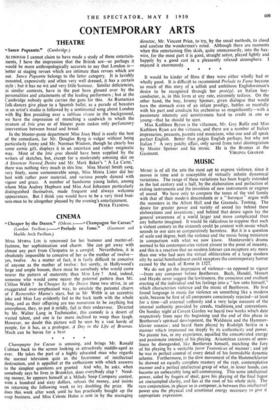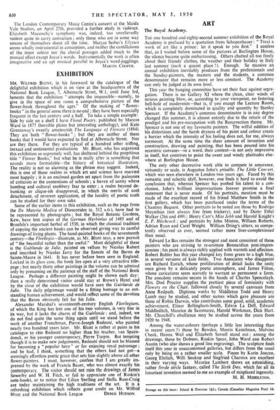MUSIC MUSIC is of all the arts the most apt
to express violence, since it moves in time and is susceptible of virtually infinite dynamical variations. The range of these variations has been hugely extended in the last century and a half, by the elaboration and perfection of exiting instruments and the invention of new instruments or engines of sound. We have only to compare the tones of the viol family with that of their modern descendants or a " baroque " organ with the monsters in the Albert Hall and the Granada, Tooting. The desire for greater power and variety of sound lay behind these elaborations and inventions ; and behind that desire again lay the general awareness of a world larger and more complicated than any hitherto imagined. It would be ridiculous to suppose that such a violent century as the sixteenth could be content with music which sounds to our ears so comparatively harmless. But it is a question of scale and degree, both the violence and the music being miniature in comparison with what we now know. Monteverde's drama seemed to his contemporaries violent almost to the point of insanity, and this is a reaction that no modern listener can recapture any more than one who had seen the virtual obliteration of a large modern city by aerial bombardment could recapture the contemporary horror caused by the sack of Rome in 1527.
We do not get the impression of violence—as opposed to vigour —from any composer before Beethoven. Bach, Handel, Mozart and Haydn never suggest the lawlessness, the conscious and exultant erecting of the individual and his feelings into a " law unto himself," which characterises violence and the music of Beethoven. He first found language in music for violence on something like a modern scale, because he first of all composers consciously rejected—at least for a time—all external authority and a very large measure of the internal authority provided by creeds, traditionand conventions. On Sunday night at Covent Garden we heard two works which date respectively from near the beginning and the end of this phase in Beethoven's spiritual development, the Waldstein and the Hammer- klavier sonatas ; and heard them played by Rudolph Serkin in a manner which impressed me deeply by its authenticity and power. No pianist has, in my experience, equalled the concentrated energy and passionate intensity of his playing. Arisotelean canons of seem- liness he disregarded, like Beethoven himself, matching the fury of his playing by a veritable furor Teutonicus of manner ; and yet he was in perfect control of every detail of his formidable dynamic scheme. Furthermore, in the slow movement of the Hammerklavier he showed an equally complete mastery of the rapt, contemplative manner and a perfect intellectual grasp of what, in lesser hands, can become an unbearably long self-communing. This same intellectual power, aided by fingers of steel, gave his playing of the final fugue an unexampled clarity, and lies at the root of his whole style. The rare conjunction, in player as in composer, is between this intellectual power anu the physical and emotional energy necessary to give it appropriate expression. The London Contemporary Music Centre's concert at the Maida Vale Studios, on April 27th, provided a further study in violence. Elizabeth Maconchy's symphony was, indeed, too unrelievedly violent quite to carry conviction ; only those who are in some way unsure of themselves shout all the time. Matyas Seiber's Ulysses seems wholly instrumental in conception, and neither the cantillations of the tenor soloist nor the choral passages added much to the musical effect except Joyce's words. Instrumentally the work is often imaginative and an apt musical parallel to Joyce's word-jugglings.
MARTIN COOPER.







































 Previous page
Previous page